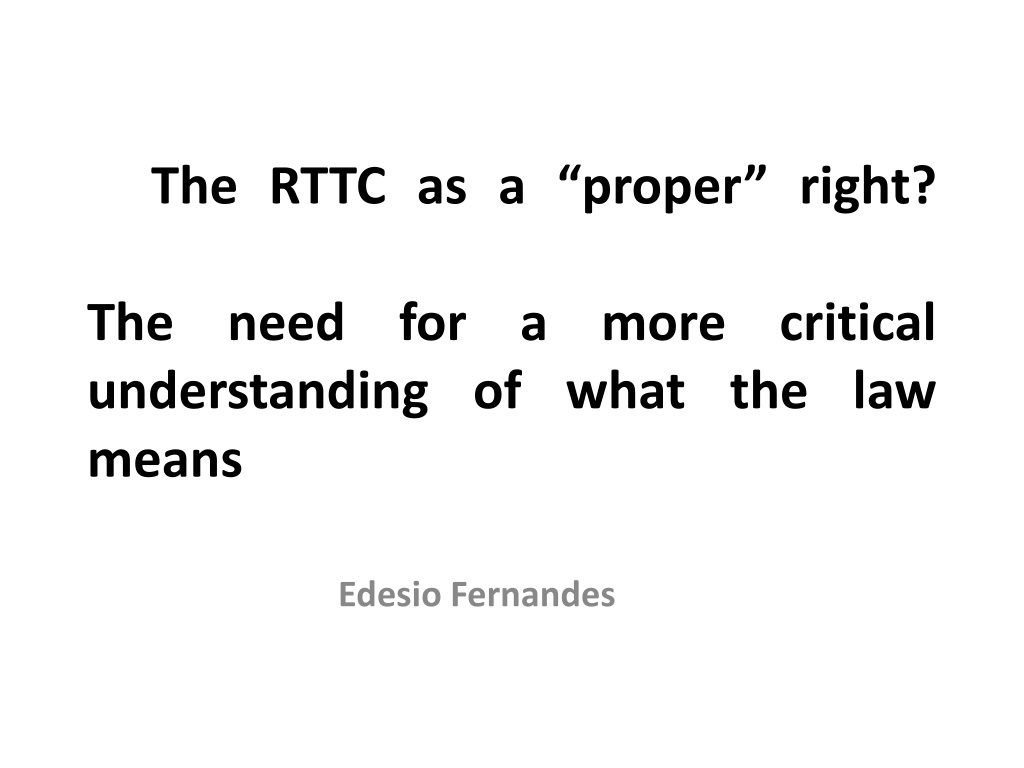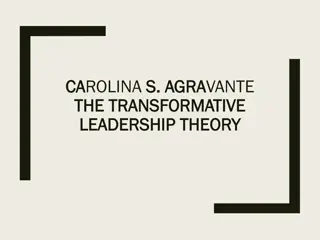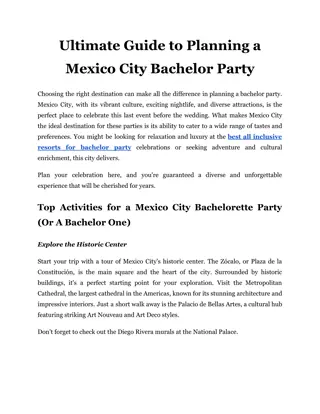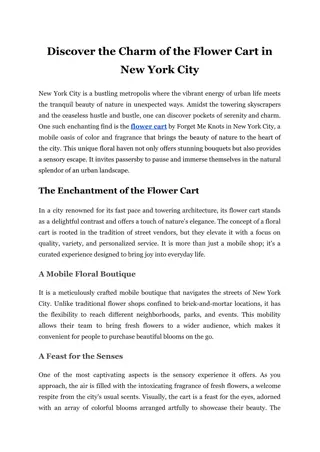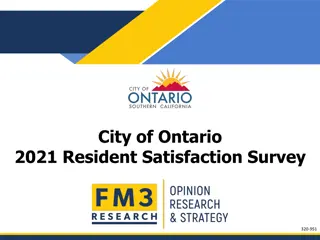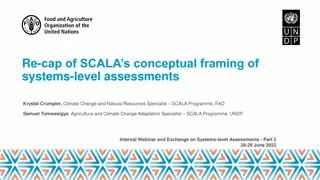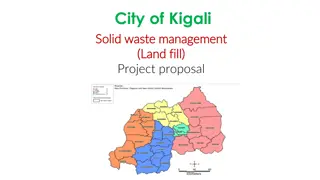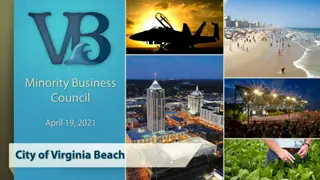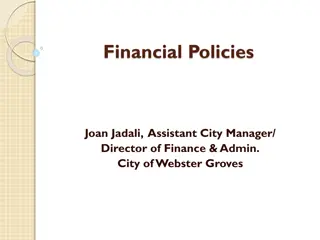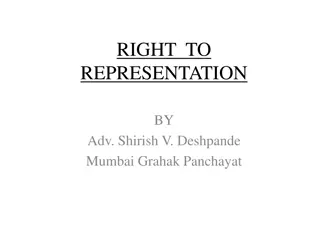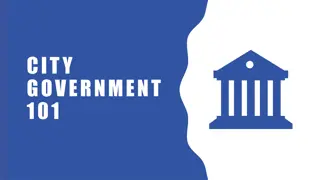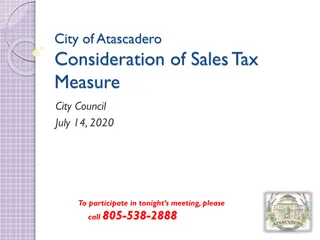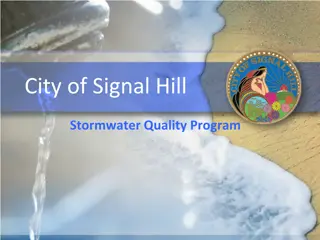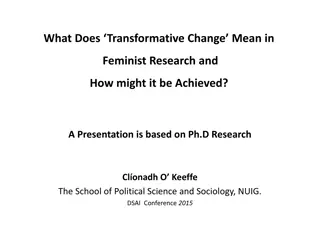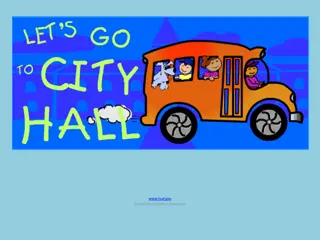Exploring the Transformative Right to the City Concept
Delve into the multifaceted nature of the Right to the City (RTTC) as a potential proper right, encompassing philosophical frameworks, sociopolitical agendas, and urban reform initiatives. This concept challenges traditional legal notions, advocating for a broader sociopolitical process to address urban governance, inclusion, and legal reform. The need for a conceptual shift towards viewing law as a sociopolitical process emerges, emphasizing the importance of clearer definitions and precision in understanding the implications of RTTC. Who holds this right, be it for human necessities like water and housing or broader social functions, remains a key question in the discourse on human rights in the city.
Download Presentation

Please find below an Image/Link to download the presentation.
The content on the website is provided AS IS for your information and personal use only. It may not be sold, licensed, or shared on other websites without obtaining consent from the author.If you encounter any issues during the download, it is possible that the publisher has removed the file from their server.
You are allowed to download the files provided on this website for personal or commercial use, subject to the condition that they are used lawfully. All files are the property of their respective owners.
The content on the website is provided AS IS for your information and personal use only. It may not be sold, licensed, or shared on other websites without obtaining consent from the author.
E N D
Presentation Transcript
The RTTC as a proper right? The understanding of what the law means need for a more critical Edesio Fernandes
RTTC: different meanings Philosophical platform Framework for critical analysis, language to frame understanding of phenomenon Development imperative Sociopolitical agenda, rallying cry Rite, clamour, demand Rebel practices for radical city Utopian, anti-capitalist project As such, not to be institutionalised Ultimately, a revolutionary - would be Lefebvrian - perspective
Could, should it be a proper right? Is there a dimension of sociopolitical reform, a possibility of significant institutional-political reform? Urban reform , reformist agenda From within and outside the legal order, but aiming to improve and expand order There is a place and role for transgression, rule of law needs to incorporate and dialogue with it I believe so, not as a goal per se, but as a step of broader sociopolitical process Creating more arenas for identification, expression, confrontation, and possibly resolution of conflicts change through legal-
Need for conceptual shift Dispense with legalistic, instrumentalist notion, view law as sociopolitical process Together with anti-law bias , at root of scepticism More violations than achievements : who said it was supposed to be easy? At once, object and arena of renewed disputes and struggles Has played roles in socioterritorial segregation, but what does it take for law to play roles in inclusion? Not enough recognition of rights and declaration of principles, but also to create processes, mechanisms, instruments and resources of urban governance Laws enactment, enforcement and interpretation are disputed Legal reform, institutional mobilisation: elusive balance change and sociopolitical
RTTC: need for clearer definition and more precision Nature Contents Implications
What right, whose right Human (water, adequate housing) Umbrella right Human rights in the city is the same as right to the city ? Tradition of individual rights City as legal category ( social functions of the city ) Social (individual solutions) Collective (collective solutions)
What city Urban (and rural?) Municipal/local (and metropolitan areas, and river basins?) Is it a good category? (Territory would be better?) Too Brazilian-Latin American-centric?
Rhetoric, programmatic, enforceability conditions Claimable? Violations? Leilani Fahra
In what spheres National, local Or also international? Contemporary additions to set of rights UN conventions/declarations/charters Far more precise Biodiversity Global warming
At UN level Inevitable More than 50% in urban areas: what is the rule of the game for nation states and global society Difficulty and resistance: too vague, means nothing, too ambitious, unenforceable AT UN-H, land and housing always difficult Housing has disappeared from the agenda Property discussion bypassing
Yet another, not exclusive, narrative Institutionalisation does not contain the whole of the sociopolitical process Henri Lefebvre: To dream of the impossible to seize the realm of the possible
Drinking from the source Selective, partial reading of Henri Lefebvre s ideas Urban Revolution, Right to The City
Less known Du Contrat de Citoyennete
Updating Declaration of Rights Human Rights have gradually evolved Citizenship rights remain the same Introduction of range of collective rights: the right to information; the right of expression; the right to culture; the right to identity in difference and in equality; the right to self-management, that is, the democratic control of the economy and politics; the right to public and non-public services; and above all the right to the city Not only right to another city , but to this very city, improved, expanded, somewhat transformed
Two intertwined, inseparable pillars Right to habitation private/public/communal land, social function/value of property, use and exchange values, capture and redistribution of land values, housing and environmental rights, distribution of costs and benefits, informal settlements, public spaces Right to participation - condition of legal validity of laws, plans, projects, actions, decisions; participation Executive, Legislative, Judicial powers, representative and direct democracy Together, land and urban governance framework a collective right as a in/control of
The Lefebvrian message New legal bases of sociopolitical contract to support socioterritorial order Object and process of mobilisation and struggle Enormous conceptual, institutional and legal disputes around all such issues, all the way, all the time, at all stages sociopolitical,
Legal developments Brazil s City Statute (of the city itself, not only of the residents of the city) Constitution of Ecuador Montreal s Charter of Rights of Citizens Local and national laws
The way forward Discuss nature and define contents of RTTC From within and outside institutional spaces at all levels Occupy/dispute existing legal spaces Struggle for institutionalisation enactment/interpretation is part of broader struggle Make room in today s city without losing sight of Utopian horizon and
Assessment of City Statute What has happened to the Right to the City in Brazil since groundbreaking legal change? Has it stalled ? Has it perversely contributing to further sociospatial segregation?
New urban land governance framework Replaced property rights with notion of the social function of property to support democratisation of the access to urban land and housing Defined the main articulated principles of land, urban and housing policy Created processes, mechanisms, instruments, and resources aiming to render urban management viable, emphasis placed on the capture for the community of some of the surplus value generated by state action that has been traditionally fully appropriated by land and property owners tradition of unqualified individual
And more Proposed a decentralised and democratised urban governance system, in which intergovernmental articulation as well as state partnerships with the private, community and articulated with several participation in the decision- and law-making process Recognised the collective rights of residents in consolidated informal settlements to legal security of land tenure as well regularisation of their settlements voluntary forms sectors of are popular as to the sustainable For all its many shortcomings, a groundbreaking law
Municipal Master Plans - MMPs Given the highly decentralised nature of the Brazilian federalism, the materialisation framework was largely placed in the hands of the municipal administrations especially through the formulation and implementation of Municipal Master Plans MMPs Law placed in the heart of political process, at municipal level Out of some 1,700 municipalities that had a legal obligation to approve such MMPs so as to apply the City Statute, some 1,450 have already done so - which fact in itself is undoubtedly remarkable of this legal
Municipal Master Plans - MMPs Given the highly decentralised nature of the Brazilian federalism, the materialisation framework was largely placed in the hands of the municipal administrations especially through the formulation and implementation of Municipal Master Plans - MMPs of this legal Out of some 1,700 municipalities that had a legal obligation to approve such MMPs so as to apply the City Statute, some 1,450 have already done so - which fact in itself is undoubtedly remarkable
What has actually happened with the new generation of MMPs? The existing studies have clearly shown that there has been progress on many fronts The general discourse of urban reform has been adopted by most MMPs Specific sectors environment, cultural heritage have been dealt with There has been a widespread creation of ZEIS - Special Zones of Social Interest corresponding to the areas occupied settlements by existing informal
And more Whatever the variations which naturally express the different political realities in the municipalities the participatory nature of the discussion of the MMPs was remarkable; Perhaps the main achievement has been the record production of data and all sorts of information about Brazilian cities
Problems of legal efficacy undermining the new MMPs Excessive formalism municipal laws Requirement of further regulation by several subsequent laws for full enforcement Punctual changes have been promoted without participation Both the obscure legal language and the imprecise technical legal writing (urban laws are rarely written by legal professionals) have widened the scope for legal and sociopolitical disputes and bureaucracy of
Problems of social efficacy undermining the new MMPs Remain traditional regulatory, failing to territorialise proposals and intentions, as well as to intervene in the land structure and in the land and property markets The emphasis on the new tools has been placed without a clearly defined project for the city Failed to recapture surplus value resulting from state and collective action, and when this has happened, there has redistribution of the new financial resources plans, technical and been limited social
And more Failure to earmark central, serviced, vacant land for social housing No specific criteria for urban expansion, public property has not been given a social function, and no articulated socioenvironmental approach Large projects have often bypassed the MMPs and assumed collective eviction Land, urban, housing, environmental, fiscal and budgetary policies have not been integrated, and the regularisation of informal settlements is an isolated policy, imposing technical difficulties to the legalisation of informal settlements
Capacity to act/judicial interpretation Bureaucratic complexity have also meant that there has been a widespread lack of administrative capacity to act at municipal level Many MMPs are mere copies of models promoted by an industry of consultants Obscure planning language problematic as obscure legal language Judicial interpretation principles management and technical has been as using other legal
False hostages Despite the possibility of significantly changing the course of things through the formulation of profoundly different and inclusive MMPs, with the support of lawyers, urban planners and public managers remain, and have seemingly become increasingly exclusionary land and property markets that they have created and fomented in the first place, as well as of segregating public policies that they have implemented more, hostages to
The law is not the problem! Brazil s legal-urban order has significantly changed, but... Have the jurists understood that? Has the nature of urban planning been changed accordingly? Have urban managers principles? Have judges used specific principles to resolve conflicts? Has civil society wakened up to the new legal realities? assimilated the new
New rules of the game To play the game according to the new rules is fundamental for the collective construction of sustainable and fairer cities for the present and future generations Need to overcome the existing obstacles and improve the legal order further; but above all, to fight for the full enforcement of the City Statute
A general conclusion If bad laws can make it very difficult both the recognition of collective and social rights and the formulation of inclusive public policies, good laws per se do not change urban and social realities Much as they express principles of sociospatial inclusion and socioenvironmental justice, or even, as is the rare case of the City Statute, when the legal recognition of progressive principles and rights is supported by the introduction of the processes, mechanisms, tools and resources necessary for their materialisation
Renewed sociopolitical mobilization If decades of sociopolitical disputes were necessary for the reform of the legal-urban order and for the enactment of the City Statute, a new historical stage has been opened ever since, namely, that of the sociopolitical disputes at all governmental levels, within and outside the state apparatus, for its full enforcement The fact is that Brazil, and Brazilians, have not yet done justice to the City Statute To deserve the City Statute!
